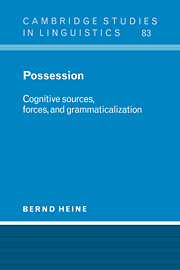1 - The state
Published online by Cambridge University Press: 27 October 2009
Summary
Introduction
Possession is a universal domain, that is, any human language can be expected to have conventionalized expressions for it. Nevertheless, when working on the linguistic expression of possession one is likely to be confronted with a number of problems.
One of these problems relates to the cognitive nature of possession. Possession belongs to the kind of concepts that tend to be described as being inherently vague or fuzzy. The English verb have has been called ‘colorless’ (Buck 1949:740) and the possessive concepts expressed by it are said to be indeterminate; have has even been described as an ‘unsuitable lexical item’:
Take an expression like a tree has leaves. In passing we may observe the oddness of this verb have, which can appear in a wide variety of contexts, and express a variety of very different relations: You have a cold, Mary has a sick grandmother, Bill has a good job, Who has the exact time? and so on. All of these at least share the feature that if you were to take away your cold, Mary's grandmother, or Bill's job, you, Bill, and Mary would still be there intact. But in addition to a tree has leaves, we can say a tree has branches, a tree has roots, a tree has a trunk, a tree has bark. Take away all the things that a tree ‘has’, and there is no tree left to ‘have’ them. (Bickerton 1990:56)
In a similar fashion, possession has occasionally been described as a concept that is neither conceptually nor linguistically basic, or that is not of universal significance.
Information
- Type
- Chapter
- Information
- PossessionCognitive Sources, Forces, and Grammaticalization, pp. 1 - 44Publisher: Cambridge University PressPrint publication year: 1997
